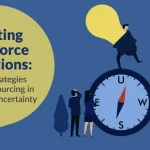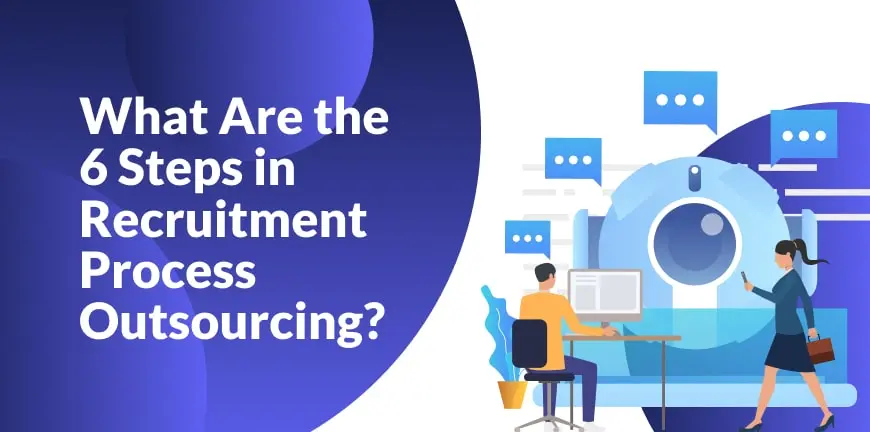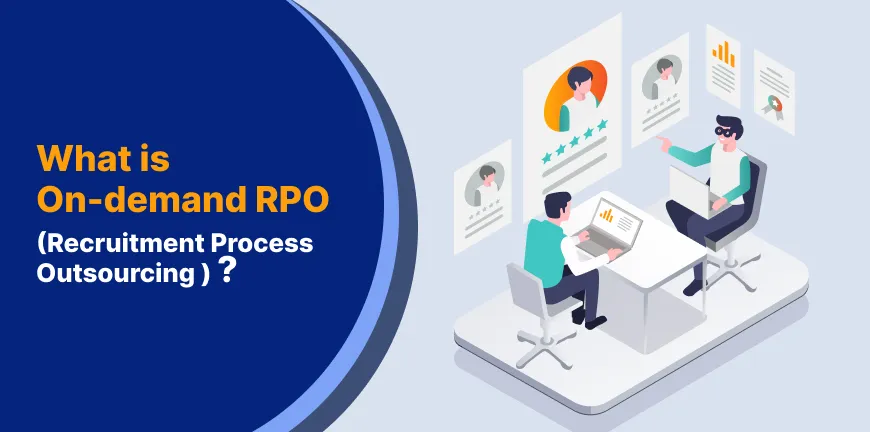
HR Outsourcing Strategies for Labor Force Disruptions
05/08/2025
What is Unemployment? Definition, Types, Causes, Impact & Solutions
05/08/2025The hiring landscape is extremely fast-paced and to attract the right talent companies need more than just job postings and CV screenings. What they need is an approach that not just cuts costs but also saves time and deliver quality talent in a consistent manner. And this is exactly what Recruitment Process Outsourcing (RPO) offers.
What is RPO?
RPO (Recruitment Process Outsourcing) is a model that allows companies to outsource part of or all of their recruitment tasks and activities to an expert third party recruitment process outsourcing services provider. This could include stages of the recruitment process like sourcing, screening, interview scheduling, onboarding, or all of it. RPO providers make sure to understand your workforce needs to the tee, and follow a structured, results-driven process that helps deliver optimum outcomes.
The type of recruitment process outsourcing business model chosen by employers will depend on the requirements and resources. The four main types of RPO that businesses generally choose from-
- Fully outsourced RPO- where the entire recruitment process is outsourced to an expert third party provider
- Half outsourced – half in-house RPO- only a few recruitment activities or processes are outsourced
- Project-based RPO- recruitment of skilled individuals to work on a particular project is outsourced
- On-demand RPO- recruitment processes are outsourced only when the organisation is looking for guidance.
What is the importance of RPO?
The key recruitment process outsourcing benefits include: –
– Companies get access to a dedicated recruitment team with extensive experience and expertise and will have 40% higher chances of building an effective talent pipeline to fill their open positions.
– Companies can reduce costs per hire and overall recruitment expenses. RPOs allow companies to alter their recruitment efforts based on the requirements.
– Access to a wide talent pool that can be utilised at any time in the future. RPO agencies have a diverse talent pool consisting of qualified candidates that fit niche and hard-to-fill positions.
RPO agencies ensure candidates receive the best experience from initial screening to onboarding and beyond. They help attract quality talent leading to an increase in brand reputation in the business world and the job market.
RPO service providers stay up to date with the latest labour laws and regulations enabling their clients to maintain compliance throughout the recruitment process.
RPO companies follow proven strategies of recruitment from initial screening to onboarding and background verification thereby mitigating risks such as bad hires, legal issues, and other issues.
What are the Steps in Recruitment Process Outsourcing?
Here are the various RPO implementation stages-
1. Recruitment Analysis & Workforce Analysis
RPO providers start by understanding the current and future workforce needs of an organisation. To start the recruitment process, RPOs understand the company’s business goals, team structures, identify skill gaps and map out the demand for talent. This ensures a proactive hiring plan which is essential for growing businesses. Some of the key benefits include-
- Improved workforce forecasting
- Clear hiring roadmaps
- Prioritize critical roles
2. Role Definition and Employer Branding
Upon gathering information about the workforce needs and creating a strategy, strong job descriptions are built to enhance the company’s brand. To create a job description, RPOs make sure to focus on not just responsibilities but also outcomes, cultural fit, and growth path. This ensures brand messaging as well as stands out to candidates.
- Accurate job listings
- Increased candidate interest
- Stronger brand perception
3. Talent Sourcing and Outreach
Finding the right candidates is more than just posting on job boards. RPO use various sourcing strategies like posting on job sites, social media, pouring into resume databases, talent networks, and passive candidate outreach. With the application of AI and data analytics, hidden talent is discovered and tapped into.
- Larger reach to high quality candidates
- Reduced time-to-source
- Access to passive talent
4. Screening and Interview Co-ordination
The filtering process is one of the main RPO process steps. It involves screening of resumes, skill assessments, background checks, reference verifications and more. This stage also includes setting up of interviews between the candidates and the hiring managers of the client company, making sure the candidates are kept informed, providing hiring managers with all the information and insights they may need to make a final hiring decision.
- Faster shortlisting of candidates
- Enhanced interview experience
- Better cultural and technical fit
5. Offer Management and Onboarding
Once the right candidates are selected, an RPO partner helps companies with the onboarding process, which involves rolling out of offers, negotiating terms, and communicating other valuable information the candidate must know before joining the company. This reduces offer-drop-offs, which has become quite common in many industries like IT and BFSI. The RPO partner takes responsibility for handling documentation, providing system logins, welcome materials to help the new hire have a great start.
- Higher offer acceptance rate
- Smooth onboarding experience
- Faster productivity ramp-up
6. Analytics and Continuous Improvement
Recruitment Process Outsourcing (RPO) has evolves in recent years and it’s no more just about hiring skilled candidates on behalf of the client. RPO providers today, offer end-to-end recruitment solutions from talent acquisition consultation to employer branding and DEI (Diversity, Equity, and Inclusion). They make sure to use the most effective processes to ensure optimum outcomes. This involves using of dashboards and reports to track KPIs like time-to-fill, cost-per-hire, effectiveness of the source and candidate satisfaction. This helps HR leaders modify strategies for future success.
- Data-driven decision-making
- Continuous process optimization
- Transparent performance tracking
Case in Point: How One Company Scaled Smarter
A growing SaaS company with operations in 3 countries was struggling with inconsistent hiring processes, slow turnarounds, and high drop-off rates. After partnering with an RPO provider:
- Time-to-fill reduced by 37%
- Offer acceptance rate increased from 64% to 89%
- Onboarding completion time dropped by 45%
Within six months, the company filled 80+ roles across engineering, support, and marketing—without overburdening its internal HR team.
Conclusion
Recruitment Process Outsourcing is not just about handing over the responsibility of the recruitment process but about transformation. A structured RPO journey allows companies to hire as per their need, provide enhanced candidate experiences and stay on top of the competition in today’s world. If you are an organization looking to reduce hiring mishaps and bring predictability to talent acquisition, RPO might just be the meaningful change your organization needs.
Frequently Asked Questions
1. What is Recruitment Process Outsourcing (RPO)?
Recruitment Process Outsourcing is a partnership between an expert RPO service provider and the client wherein the RPO provider takes responsibility for the entire recruitment process or part of it right from sourcing the candidate to onboarding them.
2. Why choose RPO over traditional hiring?
RPO (Recruitment Process Outsourcing) is cost-effective, helps in faster hiring of candidates, provides access to a wider pool of candidates, improves employer branding, and more as opposed to traditional hiring where the focus lies in filling immediate vacancies.
3. How does an RPO provider ensure cultural fit?
RPO provider provide candidates with detailed information about the company culture, values and involve actively during interviews, collaborate, and utilize the right technology to enhance candidate experience.
4. What stages can an RPO provider manage?
RPO providers take responsibility for part of the recruitment process or the entire recruitment process and can handle various stages like sourcing, screening, and onboarding.
5. What is the first step in recruitment process outsourcing?
The first step involves identifying the specific workforce needs of an organization by analysing the company’s current and future state of the recruitment process.
6. Which RPO services can be customized for different business sizes?
There are four main types of RPO that businesses generally choose from-Fully outsourced RPO- Half outsourced RPO, Project-based RPO, On-demand RPO all of which offer unique recruitment solutions based on the organization’s business needs.
7. How do RPO providers leverage technology for improved hiring?
RPO providers leverage tools like Applicant Tracking Systems (ATS), AI-powered sourcing, and data analytics to streamline operations, improve candidate quality, and reduce time-to-hire.
8. What is the role of compliance in RPO solutions?
Compliance in RPO ensures legal and ethical recruitment practices to protect both the employer and employee.
Contact Us For Business Enquiry

Amit Saproo
Amit Saproo is the Head of Operations at ALP Consulting with nearly 17 years of experience in Executive Search, RPO, Leadership, and IT & Engineering recruitment. He leads nationwide recruitment programs across Technology, BFSI, and R&D domains, driving strategic hiring solutions for diverse client needs. Amit excels in building and managing high-performance teams that deliver scalable, end-to-end recruitment and consulting services.




